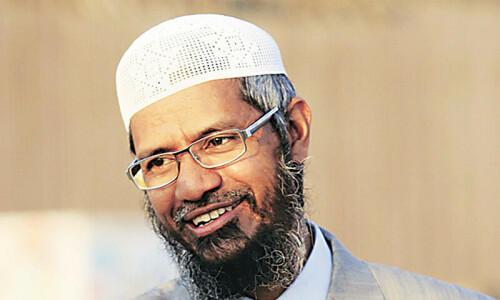SAHIWAL: In a recent letter to President Asif Ali Zardari, President Bishop of the Synod, Church of Pakistan, Rev. Dr. Azad Marshall expressed his concern regarding Dr. Zakir Naik’s remarks about the Christian community and their faith during his recent state guest visit.
The visit of Dr. Naik, which came to an end last week, included numerous individual discussions and public speeches.
“Dr Zakir Naik’s public addresses have caused significant distress within our [Christian] community, as he openly questioned the authenticity of our faith, discredited our sacred texts, and made statements that undermine the beliefs of Christian pastors and scholars,” Dr. Marshall writes in the letter, which is available with Dawn.
According to the letter, Dr. Naik’s remarks not only brought about “religious offense,” but they also “undermined the national pride of all Pakistanis, regardless of their faith.”
Despite the government’s repeated assurances of upholding religious harmony and mutual respect for all, the letter also criticizes the government for not officially expressing regret for Dr. Naik’s remarks, which have “further intensified the sense of marginalisation” felt by the Christian community.
In the letter, Dr. Marshall calls on the government to take immediate and effective measures “to prevent such divisive and harmful” incidents from occurring in the future, particularly those that are sponsored by the state.
He has said that Dr. Naik “disrespected” the founding father’s vision in his public gatherings as a state guest, referring to the historic speech that Quaid-e-Azam gave to the first Constituent Assembly of Pakistan in 1947.
Dr. Marshall went on to say that “Dr. Zakir Naik’s comments were made in open forums where our pastors and scholars were denied the opportunity to adequately respond or correct the misinformation spread by his ill-informed views.”
Dr. Marshall told Dawn over the phone that as Pakistani citizens, minorities have the right to “profess, practice, and propagate his religion” under Article 20 of the Constitution.
Additionally, he cited Article 36, which states that “the state is required to protect the legitimate rights of minorities.”
He pleaded with President Zaradari to take serious measures to guarantee that these constitutional rights are upheld and not violated by anyone.



